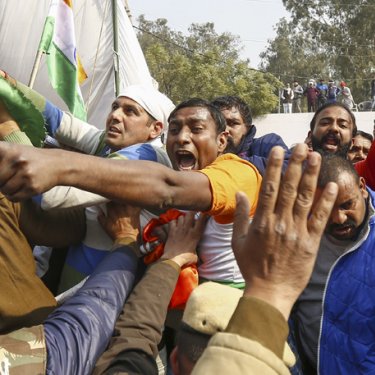India: Harassment of reporters covering New Delhi farmers’ protests

Reporters Without Borders (RSF) calls for the withdrawal of all charges brought against at least ten journalists for covering the two-month-old protests by thousands of farmers on the outskirts of New Delhi against India’s new farm laws.
What with arrests, sedition charges and social media censorship, the Indian authorities have drastically stepped up their harassment of journalists covering the protests since they degenerated into violence on the evening of 26 January, celebrated as Republic Day in India.
Many Twitter accounts, including those of a number of journalists, were suspended this morning. What they had in common was the inclusion of hashtags referring to the protests. The news agency Asia News International (ANI) put the number of censored tweets and Twitter accounts at 250, and said the accounts were suspended at the home ministry’s behest. They included all of the accounts of the magazine The Caravan and its journalists. Most of the accounts had been restored by the evening.
Mandeep Punia, a freelance journalist who writes for The Caravan, was arrested on the evening of 30 January, shortly after The Caravan published a story in which he reported that the ruling Bharatiya Janata Party had sent activists to attack the protesting farmers. Initially accused of obstructing the police, and then of violence, he was placed in detention for an initial period of 14 days without being allowed to see a lawyer.
Sedition charges
Dharmender Singh, a reporter for the news agency Online News India who was arrested at the same time as Punia, was released yesterday morning.
Siddharth Varadarajan, The Wire news website’s founding editor, has meanwhile been accused in a judicial complaint of inciting hatred and endangering the nation’s integrity – charges that each carry a possible five-year prison sentence – in an article about the death of a demonstrator, Navreet Singh, during clashes on 26 January, probably as a result of police violence. The Wire's journalist Ismat Ara learned today that she is accused in the same case.
For covering the same clashes, six other journalists have been charged with sedition, which carries a possible life sentence. They include The Caravan’s executive editor, Vinod K. Jose and its editor, Anant Nath, the author and journalist Mrinal Pande, the editor of the National weekly newspaper Zafar Agha, the columnist Rajdeep Sardesai and the cartoonist Paresh Nath.
“In the past few days, the Indian authorities have launched into a headlong assault on press freedom that puts the country on the road to an alarming authoritarianism,” said Daniel Bastard, the head of RSF’s Asia-Pacific desk. “We call on home minister Amit Shah to order Mandeep Punia’s release and the immediate withdrawal of all the absurd charges against reporters who have tried to cover the farmers’ protests.”
As RSF reported at the time, serious intercommunal violence in New Delhi’s northeastern suburbs just under a year ago was accompanied by many press freedom violations that were abetted by police inaction.
India is ranked 142nd out of 180 countries in RSF's 2020 World Press Freedom Index.



